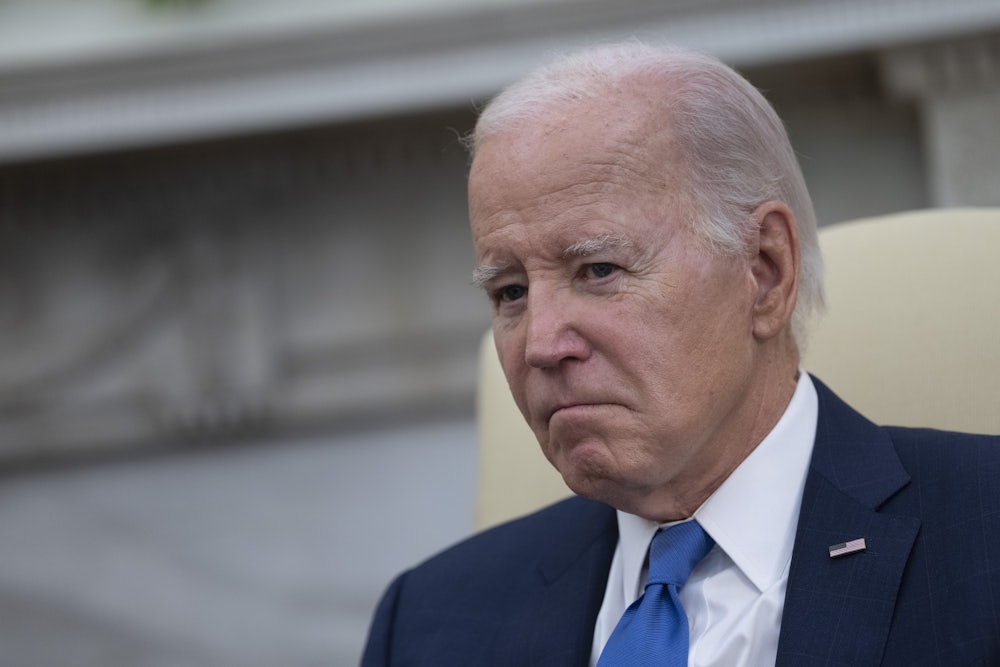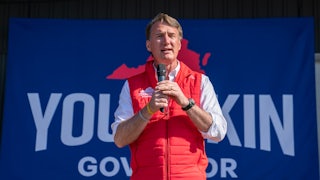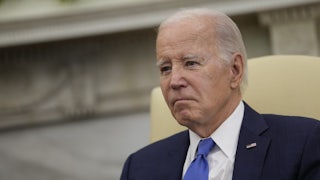As Joe Biden grapples with an unforgiving world, an indifferent electorate, and panicking polls, it is comically predictable that right-wing commentators would link him with Jimmy Carter. After all, how many failed Democratic presidents are there? Somehow ridiculing Biden as “James Buchanan Redux” doesn’t have the right contemporary zing.
Fox News commentator Liz Peek began a mid-October column by claiming, “Joe Biden’s presidency is tracking Jimmy Carter’s four years in the Oval Office so faithfully it must give his campaign team hives.” Another itchy piece was written by John Kass, a blogger and former conservative Chicago Tribune columnist, with the perfect headline, “Joe Biden is Jimmy Carter 2.0.” And The Wall Street Journal’s Kimberly Strassel is out promoting her recent book (The Biden Malaise) with the subtitle: “How America Bounces Back from Joe Biden’s Dismal Repeat of the Jimmy Carter Years.”
Granted, there are surface similarities. Since Dwight Eisenhower, only Carter was in worse shape than Biden in the Gallup Poll at this point in his first term. But Donald Trump’s and Barack Obama’s poll numbers were not much better than those of the beleaguered Biden. Moreover, Carter’s average approval rating (31 percent) was a full 9 points worse than Biden’s today at 40 percent, according to Gallup.
Beyond the exasperating polls, Carter’s problems only have a cursory resemblance to the political winds buffeting Biden. Yes, inflation was a dominant issue in the late 1970s, but the economic concept has a different meaning when prices were rising by 13.3 percent annually under Carter versus 3.7 percent now. Oft-quoted in 1979 was a concept called the Misery Index (combining the inflation and unemployment rates). It was a record-setting 19 percent under Carter, while it is 7.6 percent today.
The Iranian Revolution produced enraging lines at gas stations across country. As The Washington Post headlined in June 1979: “Gas Lines Long, Tempers Short in Panic Buying.” Carter was also, perhaps, too honest about America’s problems as his July 1979 “malaise speech” (which never used the m-word) focused on the nation’s “crisis of confidence.” And then, beginning November 4, 1979, Iranian militants held 66 Americans captive for 444 days in a takeover of the U.S. Embassy in Tehran. Tensions with Iran are at a high level after the Hamas attack on Israel, but it is hard, at this point, to see a parallel to more than a year of a nightly ABC News show called America Held Hostage.
Historical analogies are always rough. But the closest parallel to Biden’s plight is what Harry Truman endured in 1951, the third year of his second term. Linking Biden with Truman is not new. I suggested last year that rather than getting caught up in the overhyped comparisons to Franklin Roosevelt, Biden should be best likened to Truman, another underappreciated former senator. In the current Washington Monthly, Paul Glastris makes a convincing full-throated case that “the parallels between the two men are uncanny.”
While historians now rate Truman as one of America’s best presidents, you would have had an impossible task making that case to voters in 1951. Truman’s poll numbers were so far underwater that you needed to be a scuba diver to read them. His high-water mark in the Gallup Poll was 36 percent approval in January 1951, which dwindled to a glub-glub 23 percent by November.
The dominant event in 1951 was the Korean War, which had begun a year earlier and was then stalemated near the 38th parallel, the prewar dividing line between North and South Korea. General Douglas MacArthur, the preening and overconfident commander of the United Nations forces, had consistently wanted to expand the war by attacking China with nuclear weapons. In late March, frustrated by Truman’s caution, MacArthur took matters in his own hands by publicly threatening an invasion of China. MacArthur also wrote a letter (which was made public soon after) to the hawkish House Republican leader Joseph Martin declaring, “There is no substitute for victory.”
In one of the boldest moves of his presidency, Truman in mid-April fired MacArthur for insubordination. In a radio address to the nation, Truman declared, “I believe we must try to limit the war to Korea.” And at a White House staff meeting, Truman grumbled, “MacArthur’s going to be regarded as a worse double-crosser than [George McClellan],” a reference to the Civil War general who tormented Abraham Lincoln with his arrogance and obstinacy.
The firestorm was immediate. Impeachment talk was everywhere. Right-wing Indiana Republican Senator William Jenner declared, “Our only real choice is to impeach President Truman and find out who is the secret invisible government which has so cleverly led our country down the road to destruction.” A week later, MacArthur addressed a joint session of Congress, and 30 million Americans watching on television, decrying those “who would appease Red China.” As Truman biographer David McCullough put it, “The performance was masterful. The use of the rich voice, the timing, surpassed that of most actors.” But Jeffrey Frank, the author of The Trials of Harry S. Truman, offered a more contemporary view: “Decades later, someone watching MacArthur before Congress on a digital site is likely to see … a seventy-one-year-old man with an undistinguished comb-over, declaiming with studied theatricality.”
Throughout the furor, Truman displayed a public equanimity akin to that of Biden today. With his decades in Washington, Truman had the instinct to believe that the MacArthur mania would soon burn out, as it did. In 1951, American democracy seemed as much in peril as it does today. While MacArthur represented the threat of an insubordinate battlefield general, Joseph McCarthy illustrated the power of a Trumpian rabblerouser with contempt for human decency.
Two months after the firing of MacArthur, the witch-hunting Wisconsin Republican finally figured out how to exploit the furor for his own purposes. In a Senate speech, McCarthy denounced Defense Secretary George Catlett Marshall, the author of the Marshall Plan. Without evidence, McCarthy claimed that Marshall was at the center of “a conspiracy so immense and an infamy so black as to dwarf any venture in the history of man.”
Truman had all the right instincts but lacked the power or the strategy to bring down McCarthy, whose reign of terror lasted until 1954. Responding to the attack on Marshall, without ever mentioning McCarthy by name, Truman charged, “That political smear campaign is … playing right into the hands of the Russians.” But McCarthy was, in effect, rewarded for his viciousness: Marshall resigned as defense secretary in September.
Almost as damaging to Truman politically as the deadlocked Korea War were a series of minor scandals that collectively became known as the “Mess in Washington.” Reading about them now is akin to imagining how historians will react to the Republican hysteria over Hunter Biden and his laptop in the year 2100. Shady operators, many of them from Truman’s home state of Missouri, were rewarded with mink coats and deep freezes for arranging low-interest government loans to businesses. Corruption at the IRS eventually forced the president to fire 113 tax officials around the country. Truman’s mistake—and it cost him dearly politically—was a self-indulgent reluctance to confront tainted officials whom he had known and liked for years. Instead, he denounced “scandalmongers” who were “trying to get us to believe that our government is riddled with communism and corruption.”
In the 1952 election, the Republicans gleefully denounced what they called K1C2 or “Korea, Communism and Corruption.” Truman, who had privately told his top advisers at the end of 1951 that he would not run for another term, kept reconsidering his decision to bow out. In early 1952, Truman discussed it with Clark Clifford, his former close adviser turned Washington lawyer and fixer. As Clifford recalled in his memoir, Counsel to the President, “I thought it likely that the tide which he so brilliantly turned back in 1948 would sweep over him.… He was wearier than he knew, and he deserved and needed a rest.”
Clifford was right. In 1952, Eisenhower carried 39 states in a landslide victory over Illinois Governor Adlai Stevenson, who had been Truman’s choice for the nomination. Even though the Republicans came to power for the first time in 20 years, Eisenhower represented the prudent, internationalist wing of the GOP. Without Eisenhower, it is likely that the Republicans would have nominated and elected an isolationist like Ohio Senator Robert Taft or even a would-be authoritarian like MacArthur, who delivered the keynote address at the 1952 GOP convention.
It was, in hindsight, a close call in 1952. And with Biden determined to run despite the dismal polls, it may be an equally close call for American democracy in 2024. The difference is that Biden still has a year to prepare for what is likely to be a daunting election against Donald Trump or a Republican dragon-slayer like Nikki Haley. Only after Truman died in 1972 did he begin to be vindicated by history. That belated verdict would be scant consolation for Biden and the nation if Trump is elected with a near-dictatorial agenda of punishing his enemies and using the Insurrection Act to quash dissent in the world’s oldest democracy.


